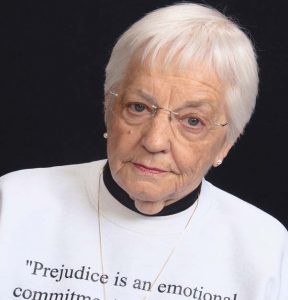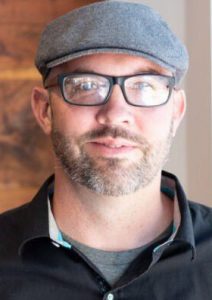One of the divisive claims made by presidential candidate Donald Trump is that immigrants are taking “Black jobs” and “Hispanic jobs” from Americans.
To better understand how this rhetoric is heard in the community, BNG interviewed three diversity and faith leaders to get their reactions and interpretations.
Jane Elliot, activist and educator who is known for her lecture on “brown eyes/blue eyes” sees in Trump’s language a call to return to the racism of the past.

Jane Elliot
“Trump wants to turn us into the divided states of America,” Elliot said. “I remember what happened before in history during the rise of Hitler. We simply don’t teach history anymore, and because the education system doesn’t teach history anymore regarding Hitler and other racist periods in history, we may go back to what we were.”
Even though Trump is clearly racist in his language and viewpoints, “there is a fear within the GOP to call him out,” she warned.
Talk of immigrants taking “Black jobs” is based on fear and a sense of white superiority, she explained.
“There is a fear that some white people have, including Trump, that if people of color get power, they will get even with them for how people of color have been treated in this country.”
Dan Crain describes himself as someone who wants to build racial bridges within the local church. He serves as director of groups and mobilization for Onerace Movement, which seeks to bring people together from all walks of life in the Christian community. And he believes Trump’s talking points are dividing the church at large.
“Trump’s rhetoric continues to divide the church. It’s like having an abusive uncle in the family of God which we all relate to in different ways,” Cain said. “Those who come from the majority culture are not affected by his words and actions like people of color are in the family of God. Because of this, it continues to divide the church.

Dan Crain
“So many people of color cannot fathom how other believers in the household of God can continue to support and vote for someone like Trump, regardless of his policies. Trump’s comments just reveal his worldview and how he views people of color in this culture. He has been treating people of color like this his whole life, dating back to the incident involving the Central Park Five. His rhetoric around refugees and immigrants is extremely harmful and has only emboldened white supremacist activity. The very people the church is called to defend, fight for and welcome are the very people he calls extremely derogatory names.”
Cain prefers to flip Trump’s negative comment about “Black jobs” and make it a positive.
“I think of Black excellence. I work for a strong Black leader in the racial reconciliation space who is the director of the ministry. However, the way Donald Trump used it was derogatory. He was specifically talking about second-class jobs that people of color oftentimes have to fill because of the structures of whiteness. It was insulting for him to use the phrase and filled with a whole lot of history and the way he perceives power and who gets to lead and who doesn’t.”
Addison Canidy, pastor of Mount Zion Church in the heart of Atlanta, lives in the same neighborhood where Martin Luther King’s childhood home is located. He’s heard this script before.

Addison Canidy
“It is imperative that faith leaders speak to the pitfalls of race relations and affirm the real experiences of those it affects,” he said. “We can’t be oblivious to the plight of our members as if praying and praising your way through marginalization, discrimination and systemic racism will solve 100% of the injustices caused by race relations in our country. We need to speak up and speak out when something is not right and when injustice is pointed in the direction of God’s people.
“I believe Jesus turning over the tables in the temple is a great example of this idea. He flipped tables because injustice was aimed in the direction of God’s people. If we are to live and lead like Christ, speaking up when God’s people are negatively impacted by race relations in this country is our reasonable responsibility. “
That’s why this pastor is speaking out about Trump’s “Black jobs” comments. In reality, Black people occupy a wide variety of jobs in America, he said.
“What comes to mind are various jobs across the spectrum of life. From president of the United States to plumber, certified public accountant to chaplain, from judge to janitor, from fitness trainer to farmer. When Donald Trump first mentioned Black jobs, the suggestion was that anyone with no skill, education or experience could do the jobs we do. Although Donald Trump himself is the embodiment of that idea, he needs to realize the beauty of America is that everyone has a chance to excel and change the trajectory of their lives.”


